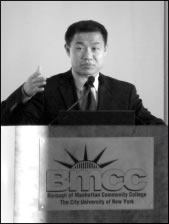BY Ishita Singh
Community members, concerned about steep cuts to the city’s education and parks and recreation departments, flocked to the Borough of Manhattan Community College in Tribeca for a borough-wide budget meeting hosted by the New York City Comptroller’s office Monday night.
Close to 40 people attended Comptroller John Liu’s meeting, one in a series of borough-specific discussions to help city residents better understand the budget process. But a $493 million cut in Department of Education funding from Mayor Michael Bloomberg’s Executive Budget proposal, released earlier this month, worried many at the meeting.
“Principals have been told to cut teachers [in order to comply with cuts],” said Shino Tanikawa, a member of the Community Education Council for School District 2, which covers most of Lower Manhattan, all of Midtown and much of the Upper East Side. “Combine increasing enrollment with teacher layoffs and you have enormous class sizes—it’s a huge concern.”
Because the Department of Education is not required to provide the city with a borough-by-borough breakdown of how it will cut funds, its budget was not featured in the Comptroller’s Manhattan-focused presentation. Instead, Marcia van Wagner, assistant comptroller for the budget, explained how the budget process works and why the city faces such difficult decisions in creating its budget for fiscal year (FY) 2011, which begins July 1, 2010.
The Mayor’s office creates budget proposals, which must then be approved by the City Council. According to regulations, the city must balance its budget each fiscal year, and can only use this year’s revenues to pay for this year’s expenses. Still, it manages to include previous years’ surpluses in its budget plans by paying future years’ expenses in advance. This year, it will pay an extra $3.2 billion. That money will in turn pay for expenses incurred during FY 2012. Though a surplus may seem like good news for the city’s economy, FY 2011 received pre-paid expenses of more than $5 billion. In order to balance this year’s budget, the city must absorb $1.4 billion of the surplus, a sign that expenses far outweigh revenues.
“Undoubtedly, there will not be enough money for everything people want,” Liu told the audience at the beginning of the meeting.
Some community members were outraged by a proposed $3.96 million cut to Manhattan’s Parks and Recreation department, which would include a $3.5 million cut to Parks and Playground Maintenance.
Frances Mastrota, the Parks chair for Community Board 11, which covers East Harlem, told Liu that the cuts were “unfair” during the question-and-answer period following the presentation. “There’s broken glass, rodents,” she said, describing parks in her neighborhood. She also stressed the importance of clean parks to a community and its children.
In a separate interview she added, “we need to have parks in the best possible condition. But I guess we better learn to conserve what we have and maintain it ourselves because the city won’t do it.”
Most of the indignation among the crowd, composed mainly of Community Board members from across Manhattan, centered on education. The first question posed to Liu during the question-and-answer session asked about the cuts to Manhattan’s education budget. Liu estimated that as many as 6,400 teachers could be laid off in the next year. He also called for a more specific breakdown from the Department of Education so that parents could know exactly how budget cuts will affect their children’s schools. “We’re continuing to push for more transparency on the budget from them,” he said.
Liu also challenged Mayor Bloomberg’s refusal to enact a temporary tax on Wall Street bonuses. “If we’re going to keep the idea of cutting 6,400 teachers on the table, then the temporary tax on humongous Wall Street bonuses should be on the table.”
The Comptroller does not have any say in planning the budget, though it does present an analysis of each of the Mayor’s budget proposals. Liu’s office focuses on “trimming the fat,” as he told his audience, of city spending. He looks for unnecessary or wasteful spending among municipal departments, and at the end of the meeting urged community members to send him tips.
“I’m here to answer questions from the public,” Liu said about his role in the budget process in an interview. “But mostly I’m identifying sources of waste and uncovering money that is kept where it doesn’t belong.”


































